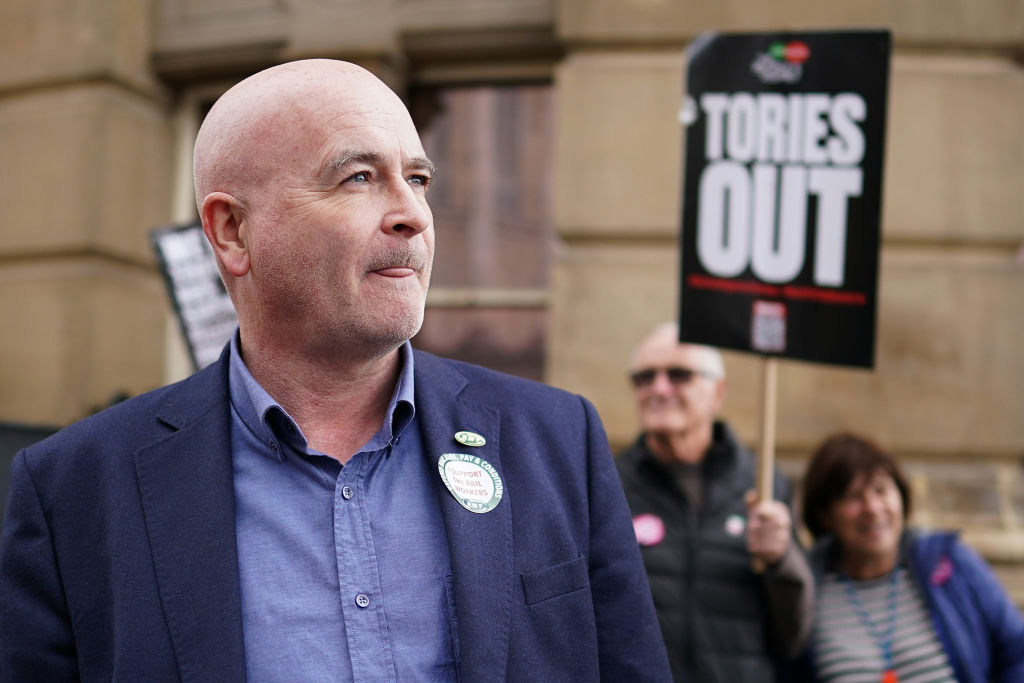Rail union leader Mick Lynch has announced his retirement. No doubt there will be plenty who will breathe a sigh of relief, be it the politicians and hapless interviewers he has skewered on live television, to the passengers whose commutes were disrupted by the RMT’s strikes.
Pugnacious in both appearance and attitude, he is a stereotypical leftie from the days of I’m All Right Jack. He once told an interviewer that ‘all I want from life is a bit of socialism’. His views range from the predictable pro-Palestinian stance to strongly supporting Brexit.
Yet, to his members, his firebrand speeches and no-nonsense approach to those who opposed him was seen as key to the eventual pay deal he won. More than that, it highlighted the workers’ struggle to the public in general, and garnered far more support than it would have done without him.
His approach was the subject of a piece I did for The Spectator a couple of years ago, though reactions to it ranged from praise in unlikely quarters to accusations of being a Marxist.
My point then, as now, is that Lynch will be remembered for far more than as an old-fashioned left winger, in the mould of Arthur Scargill or Hugh Scanlon. He does share their politics, but he is someone who can articulate the demands of his members and argue with logic, humour and even reason on the public stage.
He batted away the more ridiculous questioning from daytime TV presenters in a way that endeared him to the public – ‘what a load of twaddle’, he told Richard Madeley, for instance, when asked if he was a Marxist. ‘I’m not the grinch’, he replied when accused of ‘stealing Christmas’ with potential strikes. When Piers Morgan asked him if he saw himself as the villainous ‘The Hood’ from Thunderbirds (because they look similar), Lynch calmly replied: ‘Thunderbirds isn’t real, Piers.’
He was possibly the only union leader that a straw poll of the general public would be able to name, though perhaps that says more about the overall state of trade unions in Britain today than it does about him.
Many started to agree with him. A poll taken during the industrial action found just 18 per cent were opposed to the railway workers’ right to strike. Without Lynch, that figure would probably have been a lot higher.
Aged 63 but looking a few years older, Lynch admits that being a white, bald male is exactly what people expect a union leader to look like. After all, one of his predecessors, Bob Crow, looked remarkably similar.
Lynch is taking early retirement, perhaps conscious of Crow’s untimely death at just 52. He’s been with the union for 30 years but, unlike so many careerist general secretaries, his journey was not via university and union researcher roles. He was ‘on the tools’ for 37 years as an electrician and didn’t become an officer with the RMT until he was 54. Nor has he been on a trade union course, he claims, though my bet is that someone, somewhere, has given him some useful media training tips.
Lynch will be remembered for far more than as an old-fashioned left winger
However, for all that he achieved for his members, it is unlikely to have a far-reaching effect on raising the working class to repeat the kind of industrial chaos seen in the 1970s and 1980s. There are no instantly recognisable union firebrands ready to step into the Lynch-sized hole in what TUC staffers used to sarcastically refer to as ‘THIGMOO’ – standing for This Great Movement Of Ours, a phrase trotted out on a regular basis.
For those of us who used to cover industry when papers had industrial correspondents, Lynch’s rise to prominence was a nostalgic bit of fun, a reminder of the days of pay disputes and negotiations, table-thumping, picket lines and fiery rhetoric.
Ultimately, though, Lynch will retire without achieving any of the bigger change he really wanted. There will be no overthrow of the ruling classes, no fairer distribution of wealth filtering down from the very rich to the very poor, no nationalisation of all privatised utilities or no end of zero hours contracts and non-unionised workplaces.
Mick Lynch did well to get a decent pay rise for his members, and they will remember him fondly for that. It would be easy to focus only on his politics, but that wasn’t everything. Of course he wants a socialist state. And I want Spurs to win the league. Neither of us are going to get what we want.







Comments